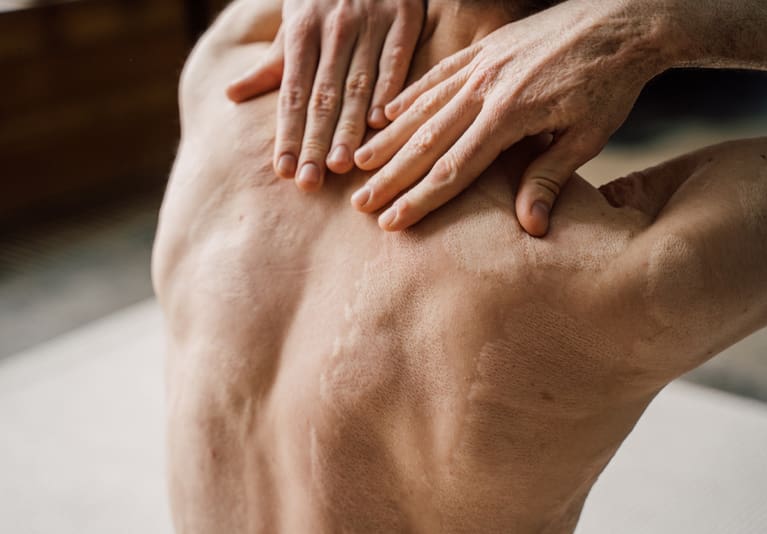What Is a Scar?
A scar forms when the skin repairs itself after an injury, surgery, or inflammation such as acne. As the body closes the wound, it produces collagen fibres to rebuild the skin, which can lead to various types of scar tissue. Factors such as skin type, depth of the original wound, and collagen production influence how scars heal and appear.
Types of Scars
1. Keloid Scars
Keloid scars are thick, raised scars that grow beyond the boundaries of the original wound. They result from too much collagen during healing. Keloids are more common in dark skin and may feel itchy or tender. Sometimes, the scar feels warm due to active blood vessels.
Treatment Options:
- Corticosteroid injections to reduce inflammation
- Laser therapy to flatten scars and reduce redness
- Pressure therapy and silicone gel to prevent keloid formation
- Surgical removal or scar revision for larger keloids
2. Hypertrophic Scars
These are raised scars like keloids but confined to the original wound. They often flatten over time but can remain red or firm for months.
Treatments Include:
- Steroid injections
- Silicone gel sheeting
- Pulsed dye laser to target blood vessels and reduce redness
3. Atrophic Scars
These are sunken scars formed when there is a loss of tissue, often due to severe acne or chickenpox. They include:
- Ice pick scars (deep and narrow)
- Boxcar scars (wide with defined edges)
- Rolling scars (wavy and shallow)
Treatments for Atrophic Scars:
- Dermal fillers to lift depressed scars
- Laser resurfacing to smooth the skin’s surface
- Microneedling to stimulate collagen production
- Scar creams and topical treatments for texture improvement
4. Contracture Scars
These occur when the skin pulls together tightly during healing, often after burns. Scar contractures can restrict movement and affect underlying muscles and nerves.
Treatment Approaches:
- Skin grafts to replace lost tissue
- Surgical scar revision
- Physical therapy to improve mobility
5. Acne Scars
Acne scars can be either pitted scars, like an ice pick or boxcar scars, or post-inflammatory hyperpigmentation that leaves dark marks. Acne can also lead to raised scars in more severe cases.
Treating Acne Scars:
- Light treatments and laser therapy
- Chemical peels for surface exfoliation
- Topical retinoids and scar creams
- Laser resurfacing to remodel collagen
6. Stretch Marks
Though not technically scars, stretch marks occur due to rapid stretching of the skin and collagen rupture. They often appear during pregnancy, growth spurts, or weight changes.
Treatment Includes:
- Laser therapy to stimulate collagen
- Microneedling
At Goutos London, Mr Ioannis Goutos can treat raised scars in a variety of ways thanks to his bespoke scar treatment plans. His treatment plans are designed to activate the body’s natural healing process.
When and How Do Scars Fade?
Most scars fade over time, changing from red or purple to pale or flat scars. However, some scars remain prominent due to excess scar tissue or underlying skin damage. Factors like sun exposure, genetics, and skin type can affect how well scars heal.
Advanced Scar Treatments
At Goutos London, we offer cutting-edge treatments that target a wide range of scar types:
- Laser Treatment & Laser Therapy: Ideal for raised and pigmented scars, helping to flatten scars, reduce redness, and improve texture.
- Skin Graft: A surgical procedure that involves removing healthy skin tissue from one part of the body and using it to repair skin on another part.
- Scar Removal Surgery: For more severe cases, surgical intervention combined with other treatments can produce excellent results.
- Subcision: A small surgical procedure targeting acne, pitted, or depressed scars reducing the scar lines, leaving behind a fine line scar or few which is likely to be less visible.
- Pressure Therapy and Silicone Gel: Helpful in preventing raised scars after surgery or injury.
- Injectable Steroid Injections: Injectable steroid injections are great for patients who want to relieve itching, make a scar flatter, and reduce pain.
At Goutos London we have plenty of treatment options, and a world-renowned plastic Surgeon in Mr Ioannis Goutos to perform them. Whether you want to treat a scar-covered area, completely flatten a scar, or save the surrounding skin, at Goutos London we can help you.
When to See a Skin Specialist
If your scar is causing pain, restricting movement, or doesn’t improve over time, it’s important to consult a skin specialist. In rare cases, abnormal scars can be mistaken for developing skin cancer, so timely evaluation is essential.
Whether you are dealing with acne scars, keloids, contracture scars, or stretch marks, effective solutions exist to improve skin appearance and restore confidence. With expert care, most scars can be significantly reduced or camouflaged to blend with your normal skin.
At Goutos London, we specialise in personalised treatments including laser therapy, skin camouflage, and advanced scar revision techniques. Let us help you navigate the journey to healthier, smoother skin.
Ready to treat scars and rediscover confidence in your skin? Book a consultation with Goutos London today. Click here, call 07908422412, or email INFO@GOUTOSLONDON.COM today to learn about the effective treatments we offer to help you get rid of all types of scars.
Find Our Clinic
Goutos London
152 Harley Street
London
W1G 7LH









